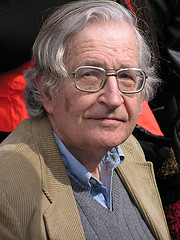Noam Chomsky: Difference between revisions
imported>Subpagination Bot m (Add {{subpages}} and remove any categories (details)) |
imported>Benjamin Seghers (and anarchist) |
||
| Line 7: | Line 7: | ||
His most famous accomplishment in [[linguistics]] is the theory of [[generative grammar]], which he established in his [[1957]] book ''Syntactic Structures''. His theory formed the basis of the school of [[generative linguistics]]. | His most famous accomplishment in [[linguistics]] is the theory of [[generative grammar]], which he established in his [[1957]] book ''Syntactic Structures''. His theory formed the basis of the school of [[generative linguistics]]. | ||
In politics, he is known for his [[libertarian socialism|libertarian socialist]] [[ideology]] and his opposition to United States [[foreign policy]] and big [[corporation]]s. | In politics, he is known for his [[libertarian socialism|libertarian socialist]] and anarchist [[ideology|ideologies]] and his opposition to United States [[foreign policy]] and big [[corporation]]s. | ||
==Early life== | ==Early life== | ||
Revision as of 21:19, 26 March 2008
Noam Chomsky (born December 27th, 1928) is an American linguist and political theorist as well as a professor emeritus at the Massachusetts Institute of Technology.
His most famous accomplishment in linguistics is the theory of generative grammar, which he established in his 1957 book Syntactic Structures. His theory formed the basis of the school of generative linguistics.
In politics, he is known for his libertarian socialist and anarchist ideologies and his opposition to United States foreign policy and big corporations.
Early life
Linguistics
Political activities
Chomsky's political activities are the natural outcome of his theoretical model of the socio-economic control system at the heart of modern society. They cannot be critiqued properly without understanding his control model and the claims to its scientific standing.[1]
Criticism
Footnotes
- ↑ ...His politically ‘extreme’ conclusions are derived from his use of evidence created and supplied by those in power... (Alison Edgley)
